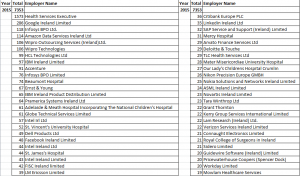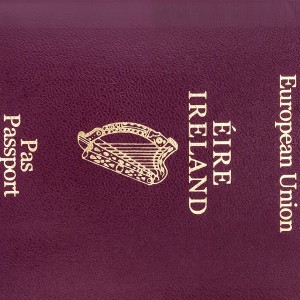Irish companies with a track record of offering work visas
Since starting this site a couple of years ago, I have noticed that a significant portion of people who want to make the move to Ireland, have no other means to do so than to rely on a company bringing them over with an offer of employment.
It's not easy to find companies who are willing to 'sponsor' employees to come to Ireland. Based on data published on djei.ie, there were over 1500 companies in Ireland who employed people on work visas in 2015, however nearly 1000 of those offered a work visa to just ONE employee.
In most cases the stars really do need to align. First off, the company has to have an interest in going this route to find an employee, and they also need the financial means to do so. Also, you need to be considered an eligible candidate, which may be harder than you think (see below). And to top it off, there's a bunch of legal hoops to jump through to accomplish it.
I've emailed back and forth with quite a few of you at various times about ways to find these types of companies. I know some of us may have posted a couple of links in the forum, but I wanted to be sure this information is easy to find for anyone searching for it.
Irish companies with a track record of offering work visas
There is one surefire way to find a list of companies who have a track record of employing people in Ireland who need a work visa. This information is publicly available, and may be of use to those of you looking for that 'golden ticket'. At the very least it will give you an idea of whether or not businesses in your industry look for overseas candidates for positions.
The Department of Jobs, Enterprise and Innovation publishes an annual list of statistics breaking down employment permit information with the following data: Permits issued by: nationality, company, sector and county.
Click through to this link on the DJEI.ie website to download excel spreadsheets of this information going back a number of years.
As you can see from the screenshot below (click to enlarge), where I grabbed the top 50 companies by number of permits, there were a total of 7353 employment permits issued in 2015. Sitting at number one is the HSE (with 1573 permits - 21% of the total) implying that there is a dramatic shortfall in available Irish/EU healthcare workers. Also high on the list were Google, Amazon, IBM, Accenture, Dell and Facebook, which may imply a significant need for overseas technology candidates.

Permit qualification restrictions
As mentioned above, it is difficult to land a job that will offer employment to permit-needing candidates (basically almost any non-EEA citizen). There are income and job category restrictions in place which add to the complicated nature of employing people from overseas. For example (data correct as of 2016), to qualify for a work permit you will be required to command a salary of 60,000+ Euro unless your occupation falls in to the highly skilled category, whereby a salary of 30,000+ Euro will suffice. Even if you find a job willing to pay you 60k+ (which is rare in Ireland), you may not qualify for a permit if your occupation is on the list of ineligible categories of employment.
Other useful links
I just want to mention 2 other sources that may be useful in finding company information.
1. Top1000.ie (or the Top1000.ie iOS app) is a site/app created by the Irish Times. It's worth checking out for company info, business podcasts, industry info etc.
2. IDAireland.com has a very thorough Irish company listing. It's searchable by sector, country of origin and more. Maybe you'll even find a company you've worked at elsewhere in the world listed there. It might help you get a foot in the door 🙂 The list can be found here.
Brexit affect?
It'll be interesting over the coming years to see how Britains exit from the EU will affect the numbers above. Will we have even less available healthcare workers if British people can't work in Ireland? Or will we have more, if Irish people can't live/work in Britain as freely as they can now?
Similarly, will countries leave the UK, or want to move there, when Brexit becomes a reality? Will we need more non-EEA workers, or less? It's going to be interesting....
8 Comments Already
Leave a Reply
You must be logged in to post a comment.



THANK YOU, Liam, for posting this. It’s very comprehensive and easier to read than going through the DJEI website and piecing it together. Many should find this extremely helpful! 🙂
Kelsey
Appreciate the feedback, Kelsey
Hi, I must thank you Liam on behalf of all those non-EEA guys looking for the “golden ticket”.
I am a web developer for a small startup here in Florida-US, but let’s say – half a year, I’ve been searching for jobs in Ireland and trying to understand the process of that.
Thank you for the comprehensive list Liam. After a recent visit to Ireland, we fell in love with the people and the place. We are considering moving to Ireland (from UK but a nonEEA citizen) and are waiting for the perfect job opportunity. I am a Lead Product Manager and even though my role is part of Highly Skilled Eligible Occupation list, I have found it very tough to get called back from employers. Some of the employers strictly don’t let you apply if you are not an Irish or EEA citizen (which I found strange given that the role is part of Highly Skilled… List.
Raghuveer,
With so many applicants, and relatively few jobs, that’s pretty common. It’s probably a way to help reduce the number of CV’s received, as well as a way to ensure the company doesn’t have to jump through hoops to bring people into the country. It’s frustrating for people in your situation, but a hurdle you have to try to overcome if you really do want to move.
Wishing you the best in your search
Liam
Hi! Thanks for the information! Me and my partner we’re in a similar situation where non of us is a EEA citizen and I’m holding a Critical Skills Permit with Stamp 1 and she has a Stamp 3, we currently in Ireland but it has been extremely hard for her to get even an Interview. She works in Finance, and for one of the options she had, it was dropped because recruiting agencies cannot sponsor even if it’s a qualified job. If you can share your thoughts about how hard it might be to find a sponsor I would really appreciate it.
It’s hard to believe that it is so hard for partners to have an opportunity in Ireland making it so hard.
Hi Pablo,
Unfortunately it is quite difficult to get sponsorship. Many job postings will have a disclaimer saying the candidate must be eligible to work in Ireland without sponsorship. Perseverance and some luck is required.
Wishing you the best.
Thanks for this helpful post, Liam! Do you happen to know where psychologists would fit in? I don’t see them specifically listed in either the highly skilled or ineligible professions lists that you linked to (perhaps there is a different term I am missing). I’m trying to gauge my chances of landing a locum tenens, temporary, or permanent position but haven’t had much luck finding info on how common such positions are for non-EEA citizens (I’m an American). Thanks in advance for any advice you can share!